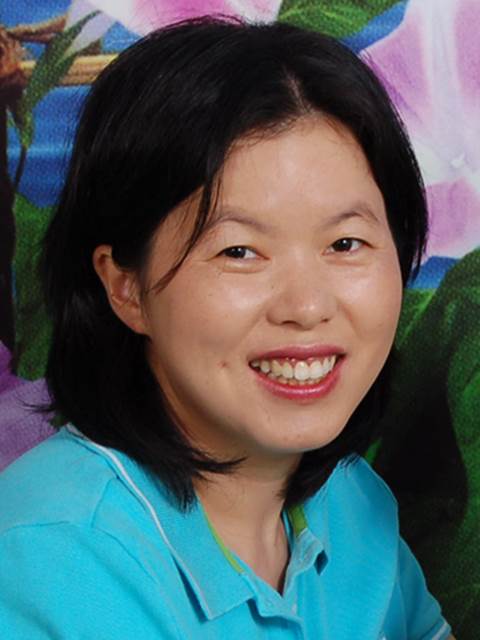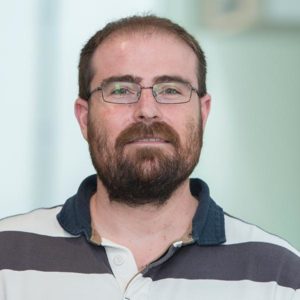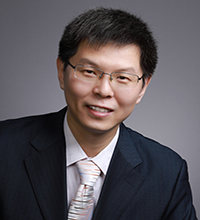Journal of Materials Chemistry B and companion journal Nanoscale have recently announced an open call to submit to a cross-journal themed collection on ‘Nanozymes’
This cross-journal themed collection aims to highlight recent progress in the field of nanozymes research with applications ranging from biosensing and therapeutics to environmental protection and national security and beyond. This collection will serve as a platform to not only accelerate the development of the nanozyme field but also attract more researchers to explore the hidden characteristics of nanomaterials for broad applications.
The Guest Editors for this themed collection are Prof. Shaoqin Liu (Harbin Institute of Technology, China), Prof. Vincent Rotello (University of Massachusetts, USA), Prof. Asier Unciti-Broceta (University of Edinburgh, UK) and Prof. Hui Wei (Nanjing University, China)
Find out more about our Guest Editors below:

Prof. Shaoqin Liu Harbin Institute of Technology, China |
Professor Shaoqin Liu is an Associate Editor for Journal of Materials Chemistry B. She received her Bachelor degree and Ph. D degree from Wuhan University of Hydraulic and Electric Engineering in 1994 and from Changchun Institute of Applied Chemistry (Chinese Academy of Science) in 1999, respectively. She started her chemistry research career under Professor Shaojun Dong group at Changchun Institute of Applied Chemistry to develop polyoxometalates-based thin film. After her Ph. D degree, she moved to Max-Planck-Institute of Colloids and Interface as Humboldt Fellow. She developed polyoxometalates-based functional materials. In 2004, she joined National Research Council of Canada as NESRC fellow to study direct methanol fuel cells. In 2007, she started her academic career as a Full Professor in Harbin Institute of Technology. Her current research interests include preparation of nanostructured materials and their applications in energy, biosensing and cancer therapy.
|
Prof. Vincent Rotello University of Massachusetts at Amherst, USA |
‘Bioorthogonal nanozymes use the versatility and unique properties of nanomaterials to provide in situ drug factories for treating diseases at their source’ |
Vincent Rotello is the Charles A. Goessmann Professor of Chemistry and a University Distinguished Professor at the University of Massachusetts at Amherst. He received his B.S. in Chemistry in 1985 from Illinois Institute of Technology, and his Ph. D. in 1990 in Chemistry from Yale University. He was an NSF postdoctoral fellow at Massachusetts Institute of Technology from 1990-1993, and joined the faculty at the University of Massachusetts in 1993. He has been the recipient of the NSF CAREER and Cottrell Scholar awards, as well as the Camille Dreyfus Teacher-Scholar, the Sloan Fellowships. He has received the Arthur C. Cope Scholar Award (2023), the Transformational Research and Excellence in Education Award presented by Research Corporation, the Bioorganic Lectureship of the Royal Society of Chemistry (UK), the Australian Nanotechnology Network Traveling Fellowship, the Chinese Academy of Sciences President’s International Fellowship for Distinguished Researchers. (2016) and the Langmuir Lectureship (2010), and He is a Fellow of both the American Association for the Advancement of Science (AAAS) and of the Royal Society of Chemistry (U.K.). He is also recognized in 2014, 2015, 2018-2022 by Thomson Reuters/Clarivate as “Highly Cited Researcher” His research program focuses on using synthetic organic chemistry to engineer the interface between the synthetic and biological worlds, and spans the areas of devices, polymers, and nanotechnology/bionanotechnology, with over 625 peer-reviewed papers published to date. He is actively involved in the area of bionanotechnology, and his research includes programs in delivery, imaging, diagnostics and nanotoxicology.
|
Prof. Asier Unciti-Broceta University of Edinburgh, UK |
‘The synergistic combination of nanotechnology, metal catalysis and medicinal chemistry has opened new avenues to mediate controlled pharmacological activity in living environments. This distinctive field of the bioorthogonal realm is driven by therapeutic aspirations that are yet to achieve their full potential. I am interested in facing these challenges with novel technologies such as bioorthogonal nanozymes that can deliver new-to-life functions to treat disease where and when needed.’ |
Asier Unciti-Broceta is Professor of Medicinal Chemistry at the University of Edinburgh and Fellow of the Royal Society of Chemistry. He received his PhD from the Universidad of Granada, Spain, in 2004. After postdoctoral training in the fields of cell delivery and chemical biology at the School of Chemistry of the University of Edinburgh, he took a group leader position in 2010 at the Institute of Genetics and Cancer to create the first chemistry lab of the Institute. He was promoted to Reader in 2015 and to Full Professor in 2018. His lab is interested in the exploration of novel chemical strategies to improve the efficacy and safety of cancer treatments, including the development of catalytic nano- and microdevices for the controlled activation of anticancer drug precursors.
|
Prof. Hui Wei Nanjing University, China |
‘Nanozymes are emerging enzyme mimics. They are functional nanomaterials with enzyme-like activities, and advantageous over conventional enzyme mimics. Recently, nanozyme is selected as one of the 2022 Top Ten Emerging Technologies in Chemistry. I am interested in rational design of nanozymes and exploring their killer applications, and look forward to the contributions in these areas.’ |
Hui Wei is a Professor at Nanjing University and a Fellow of the Royal Society of Chemistry. He received his B.S. degree from Nanjing University (advisor: Professor Xinghua Xia) and Ph.D. degree from Changchun Institute of Applied Chemistry, Chinese Academy of Sciences (advisor: Professor Erkang Wang). He then joined Professors Yi Lu’s and Shuming Nie’s groups for two Postdoctoral trainings before he started his independent career at Nanjing University. His research interests are focused on the design and synthesis of functional nanomaterials (such as nanozymes) and the development of new methodologies for analytical and biomedical applications.
Submit your work to the collection by 1 May 2023
For more information on how to submit, see our open call blog post
We look forward to receiving your submissions!













